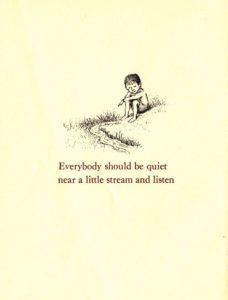Labor’s Day of Repose
‘Leisure lives on affirmation. It is not the same as the absence of activity…or even as an inner quiet. It is rather like the stillness int he conversation of lovers, which is fed by their oneness.’
︶⁀°• •° ⁀︶
Maria Popova:
“We get such a kick out of looking forward to pleasures and rushing ahead to meet them that we can’t slow down enough to enjoy them when they come,” Alan Watts observed in 1970, aptly declaring us “a civilization which suffers from chronic disappointment.” Two millennia earlier, Aristotle asserted “This is the main question, with what activity one’s leisure is filled.”
[…]
So how did we end up so conflicted about cultivating a culture of leisure?
In 1948, only a year after the word “workaholic” was coined in Canada and a year before an American career counselor issued the first concentrated countercultural clarion call for rethinking work, the German philosopher Josef Pieper (May 4, 1904–November 6, 1997) penned Leisure, the Basis of Culture (public library) — a magnificent manifesto for reclaiming human dignity in a culture of compulsive workaholism, triply timely today, in an age when we have commodified our aliveness so much as to mistake making a living for having a life.
In a sentiment Pico Iyer would come to echo more than half a century later in his excellent treatise on the art of stillness, Pieper adds:
Leisure is a form of that stillness that is necessary preparation for accepting reality; only the person who is still can hear, and whoever is not still, cannot hear. Such stillness is not mere soundlessness or a dead muteness; it means, rather, that the soul’s power, as real, of responding to the real — a co-respondence, eternally established in nature — has not yet descended into words. Leisure is the disposition of perceptive understanding, of contemplative beholding, and immersion — in the real.
But there is something else, something larger, in this conception of leisure as “non-activity” — an invitation to commune with the immutable mystery of being. Pieper writes:
In leisure, there is … something of the serenity of “not-being-able-to-grasp,” of the recognition of the mysterious character of the world, and the confidence of blind faith, which can let things go as they will.
[…]
Leisure is not the attitude of the one who intervenes but of the one who opens himself; not of someone who seizes but of one who lets go, who lets himself go, and “go under,” almost as someone who falls asleep must let himself go… The surge of new life that flows out to us when we give ourselves to the contemplation of a blossoming rose, a sleeping child, or of a divine mystery — is this not like the surge of life that comes from deep, dreamless sleep?
[full article at brain pickings.org]

Leave a Reply